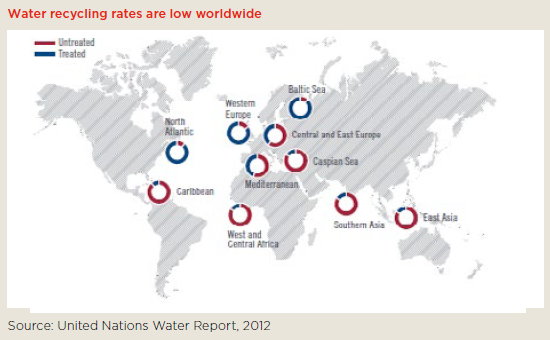Quenching the world's thirst
UN and OECD studies highlight the need for better water provision. Precious, yet squandered. This is the precarious status of the worlds water resources, as revealed in a series of new studies by the UN and OECD.
The reports, released to coincide with the World Water Forum in Marseille in March, predict that population growth and climate change could soon turn fresh water into one of the world’s scarcest commodities.
According to the OECD, with the world population set to increase by 2 billion to 9 billion over the next 40 years, demand for water can be expected to rise by more than 50%. Under this scenario, two in five people will be living in areas suffering “water stress”. Agriculture is the main reason why water demand will rise rapidly. To feed 9 billion people by 2050, farmers will have to increase food production by 70%.
This, the UN says, will boost demand for water in the agricultural industry by 20%, a huge rise for a sector that already consumes more than two thirds of the world’s useable water.
The imbalance in demand and supply will be made worse by changes in the world’s climate. Shifts in rainfall patterns, the steady disappearance of glaciers and changing river flows will each have a negative effect on water supply.
Easing the strain – solutions from the private sector
While bringing supply and demand into balance will be a difficult process, there are reasons to believe the picture will not be quite so bleak.
Supranational organisations like the UN and OECD, governments and public water utilities will have a large part to play in ensuring the world’s water resources are efficiently managed.
But these non-commercial entities are not equipped to solve such problems on their own - the private sector will also have a major contribution to make.
As an investment manager, Pictet Asset Management has always believed in private companies’ capacity to help solve some of the problems that threaten to stall economic progress.
Such ingenuity and competence is in plentiful supply in the water services industry - there are many firms that possess the management expertise, products and services that can help ease the strain on the world’s water resources.
Just as importantly, these firms also have the necessary access to capital.
It is in the area of water recycling, an activity which will be crucial in reversing the world’s water shortage, where the skills of the private sector are being deployed to particularly good effect.

The world currently recycles just 20% of its used water – an unsustainably low level if it is ever to bring demand and supply into equilibrium. There is, however, evidence to suggest that the water treatment technologies being developed by private firms can have a significant impact on water re-use rates.
Chile, for instance, a pioneer in the privatisation of water services, now treats or recycles 90% of its urban waste water compared to just 8% some 20 years ago. In Sydney, the percentage is closer to 100%.
Such successes are likely to be repeated in other countries. Water recycling has become a focus for local and national governments in both the developed and developing world.
And in response, many of the largest companies in the water services industry have made recycling a priority, investing heavily in the research and development of new wastewater purification techniques.
But water recycling is just one of many areas where private companies are making a difference. The development of more efficient irrigation techniques is another field where such firms are leading the way.
Technological breakthroughs are also being made in the area of water desalination. Here, private companies are developing technologies that reduce both the cost of desalination and its impact on the overall environment.
An investment for the long term
Overall, the world will need to invest $1 trillion per year through to 2030 to safeguard its water resources. And it is against this backdrop that the water services sector can be expected to sustain its strong rate of growth, which is currently running at 6% per year.
For investors, this presents an attractive opportunity: much of the industry’s expansion will come through the private sector. Private companies currently account for just 8% of the global water services market but this figure is expected to rise to 21% over the next decade, driven in large part by the outsourcing of water services worldwide. Having a stake in the companies that can help steer the world away from a water crisis can therefore be a rewarding endeavour for investors.